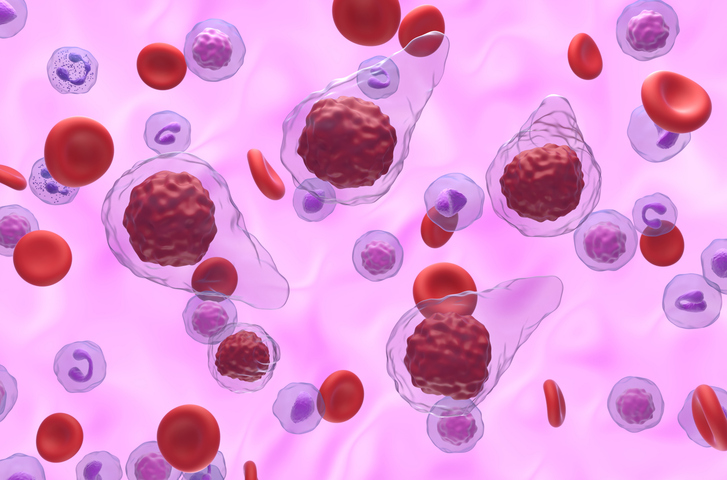
Momelotinib led to “clinically significant improvements” over danazol in myelofibrosis-related symptoms, anemia, and spleen response, according to results from the phase III MOMENTUM trial.
Srdan Verstovsek, MD, PhD, of the MD Anderson Cancer Center, and colleagues conducted the research because Janus kinase (JAK) inhibitors currently approved for myelofibrosis “do not meaningfully improve anemia,” but momelotinib, a first-in-class ACVR1/ALK2 and JAK1/2 inhibitor, has shown anemia benefits in patients with myelofibrosis.
“Current options for managing anemia in our myelofibrosis patients provide only modest and temporary benefits, so we are excited about these findings,” Dr. Verstovsek said in a news release. “The trial results suggest that momelotinib is safe, well-tolerated and can improve one of the most common and debilitating clinical problems for this patient population.”
Dr. Verstovsek and colleagues published their findings in The Lancet. They previously presented results from the phase III trial during the 14th International Congress on Myeloproliferative Neoplasms and the 2022 American Society of Hematology Annual Meeting and Exhibition.
They conducted the study to “confirm the differentiated clinical benefits” of momelotinib by comparing it with danazol, a synthetic androgen used to treat anemia, in symptomatic patients with intermediate or high-risk myelofibrosis, they wrote.
The study enrolled 195 adult patients with myelofibrosis and anemia from 107 research sites across 21 countries. Dr. Verstovsek and colleagues randomly assigned patients 2:1 to receive momelotinib plus placebo (n=130) or danazol plus placebo (n=65). Patients received oral momelotinib 200 mg once daily plus placebo or oral danazol 300 mg twice daily plus placebo. Most patients (63%) were male. The median age was 71 years in patients receiving momelotinib and was 72 years in patients receiving danazol.
The study’s primary endpoint was the Myelofibrosis Symptom Assessment Form (MFSAF) total symptom score response rate at week 24, defined as at least a 50% reduction in mean MFSAF total symptom score over the 28 days immediately before the end of week 24 compared with baseline.
A significantly higher proportion of patients receiving momelotinib had a 50% or greater reduction in MFSAF total symptom score compared with patients receiving danazol (25% vs 9%; P=.0095).
Patients receiving momelotinib also had a significant reduction in spleen size, with 25% of patients responding after 24 weeks of therapy.
These patients also required fewer blood transfusions compared to those receiving danazol, according to a news release about the trial. Transfusion independence was associated with improved survival in the SIMPLIFY-1 and SIMPLIFY-2 trials of momelotinib in patients with myelofibrosis.
Anemia and thrombocytopenia were the most frequent grade 3 or higher treatment-emergent adverse events with momelotinib and danazol. The most frequent non-hematological grade 3 or higher treatment-emergent adverse events with momelotinib and danazol were acute kidney injury and pneumonia.
“Treatment with momelotinib, compared with danazol, resulted in clinically significant improvements in myelofibrosis-associated symptoms, anemia measures, and spleen response, with favorable safety,” Dr. Verstovsek and colleagues wrote about the phase III trial. “These findings support the future use of momelotinib as an effective treatment in patients with myelofibrosis, especially in those with anemia.”
The study’s investigators are continuing to monitor overall survival and conduct ongoing patient follow-up.
“If approved, momelotinib could offer an effective option for patients with myelofibrosis to improve anemia, splenomegaly and other disease-related symptoms over other approved medications so far,” Dr. Verstovsek said in the release. “Momelotinib may also be an ideal partner for combinations with other investigational agents in development to further control myelofibrosis symptoms.”
Reference
Verstovsek S, Gerds AT, Vannucchi AM, et al. Momelotinib versus danazol in symptomatic patients with anaemia and myelofibrosis (MOMENTUM): results from an international, double-blind, randomised, controlled, phase 3 study. Lancet. 2023;401(10373):269-280.






 © 2025 Mashup Media, LLC, a Formedics Property. All Rights Reserved.
© 2025 Mashup Media, LLC, a Formedics Property. All Rights Reserved.